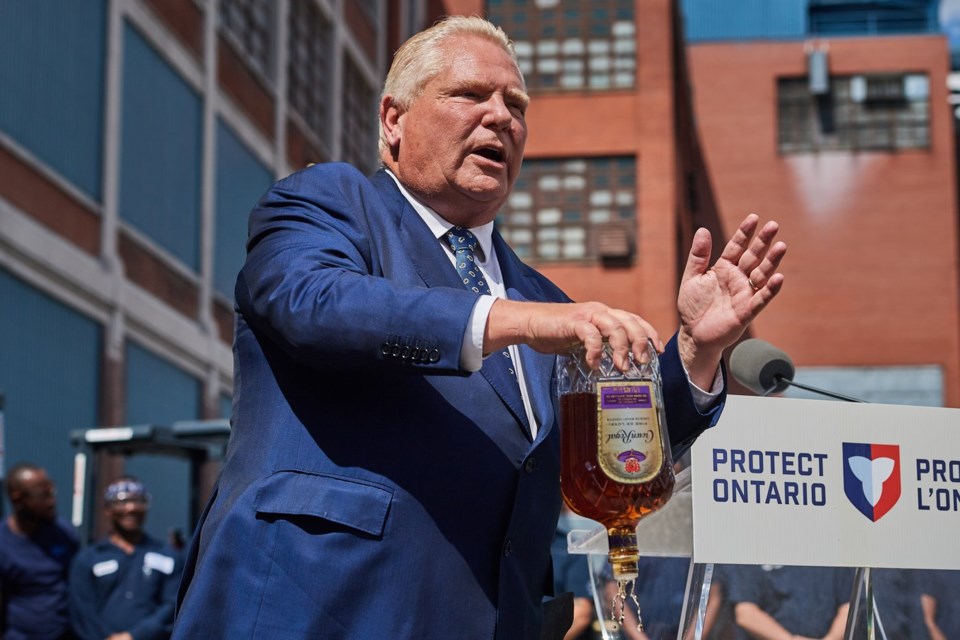The looming closure of an Ontario plant that bottles Crown Royal sparked political blowback this week, but a supply chain expert says the company behind the move faced pressing decisions on how to cut costs amid ongoing financial challenges.
Spirits maker Diageo found itself in Doug Ford's crosshairs on Tuesday when the Ontario premier capped an unrelated press conference by producing a Crown Royal bottle and proceeding to slowly dump it out on the ground.
Ford was protesting Diageo's announcement last week that it will cease operations at its bottling facility in Amherstburg, Ont., in February 2026, as it shifts some bottling volume to the U.S.
Ford said the company is "about as dumb as a bag of hammers for doing this," as he encouraged others to dump out their Crown Royal whisky and instead support alternatives made within the province.
"You hurt my people, I'm going to hurt you," Ford said in a vague warning to the company.
The political wrath extended across party lines, with NDP MPP Lisa Gretzky musing in a recent social media post about whether Crown Royal should be pulled from shelves at Ontario's alcohol retailer, the LCBO.
Diageo did not directly cite tariffs or broader trade tensions when announcing its decision. Instead, it said the facility will close in a move aimed at improving its North American supply chain.
It comes amid financial hardship for the company after last month reporting a 28 per cent year-over-year decline in operating profits, punctuated by recent announcements around the departure of its CEO and a massive cost reduction plan, said Fraser Johnson, a professor of operations management at Ivey Business School.
"Unfortunately, the plant in Amherstburg is kind of caught in the crosshairs of that," he said.
"This is, to me, all about cost savings in a pretty difficult competitive environment for the company."
He said Diageo has faced challenges such as reduced sales as the popularity of spirits wanes, along with an aging facility in the southern Ontario town. While tariffs aren't the "driving force" of the company's financial issues, Johnson said they do add risk.
"Firms are a lot more sophisticated these days in terms of optimizing their supply chain to reduce their transportation costs," he said, noting that a more centralized bottling operation would likely help Diageo's bottom line.
"If your big market is in the U.S., maybe you want to move final production, in this case bottling, closer to your consumers."
Diageo said about 200 jobs would be affected by its move.
"This was a difficult decision, but one that is crucial to improving the efficiency and resiliency of our supply chain network,” Marsha McIntosh, Diageo’s president of North America supply, previously said in a statement.
Diageo said it will engage with the community and find ways to support its employees through the transition, and work alongside Unifor to assist unionized workers. The company said it will still maintain a "significant" footprint in Canada — including its headquarters and warehouse operations in the Greater Toronto Area, and bottling and distillation facilities in Manitoba and Quebec.
McIntosh added the company's Crown Royal products will continue to be mashed, distilled and aged at its Canadian facilities.
Companies like Diageo are in a tough position where they have to figure out a balance between economics and optics, said David Soberman, a professor of marketing at the University of Toronto's Rotman School of Management.
"Crown Royal is probably a pretty big seller in the United States and so for them, they've got to do what they find best," he said.
"You can put a really big plant in Canada or a really big plant in the U.S. and obviously with tariffs, you're going to want the bigger plant on the other side of the tariff border, especially if there's a large volume being sold."
For Diageo, that likely outweighed considerations about whether its products would lose appeal among Canadian consumers by announcing an end to operations at the Amherstburg facility, said Soberman.
He said other companies in the midst of similar conundrums will likely follow Diageo's lead, even if it does prompt political theatrics.
"Their calculus will be exactly the same," said Soberman.
"If they have factories that were producing for the North American market and they're worried about tariffs ... you don't need to be a rocket scientist to realize that the United States has a market that's 10 times bigger or more than Canada."
It's not the first time the Ontario premier has lashed out at a company with cross-border ties lately.
Last month, Ford took aim at the CEO of Cleveland-Cliffs, which owns Hamilton-based steel company Stelco. Ford said Lourenco Goncalves' praise of U.S. tariffs shows he "doesn't give two hoots" about Hamilton steel workers.
Ford said at the time that Stelco should find a new owner.
"I got a problem with that guy," Ford said.
But for Diageo, it's all about "righting the ship financially" right now, said Johnson.
"And if they have to take a couple of hits on the public relations side with Doug Ford, with his grandstanding, so be it."
This report by The Canadian Press was first published Sept. 4, 2025.
Sammy Hudes, The Canadian Press




